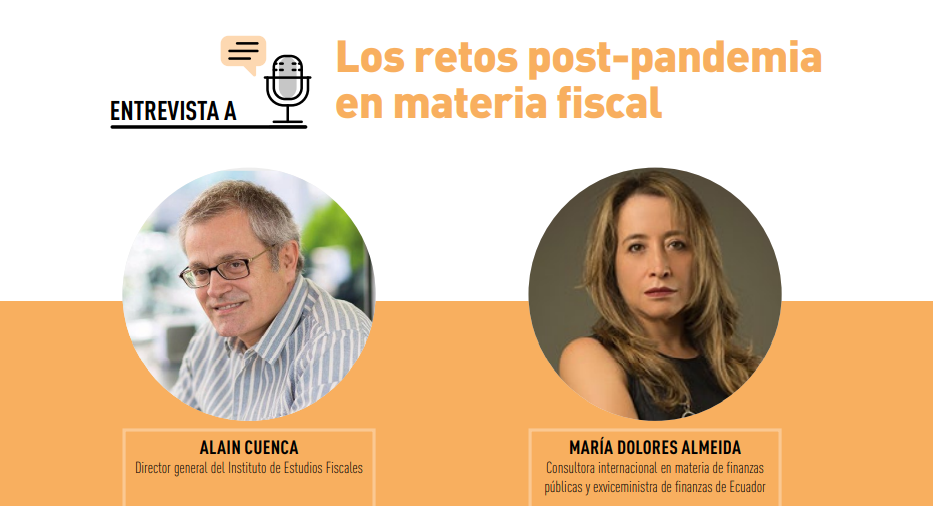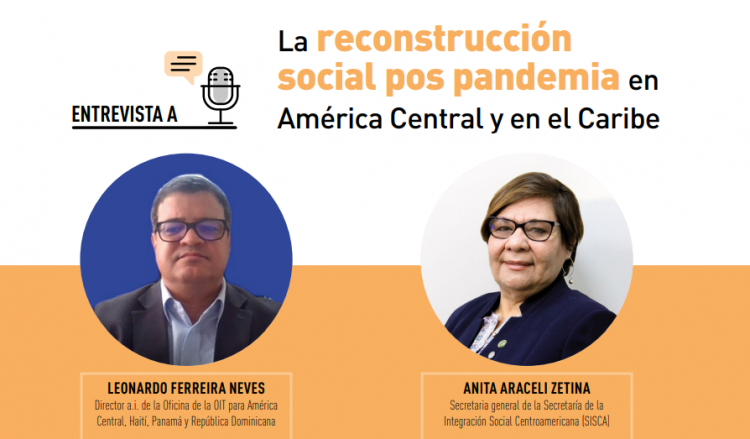The post-pandemic period has inaugurated a new fiscal and tax cycle on both sides of the Atlantic. For this reason, Fernando de la Cruz Prego interviewed for Reciprocally Alain Cuenca, general director of the Institute of Fiscal Studies, and María Dolores Almeida, international consultant on public finances and former deputy finance minister of Ecuador, who tell us about the main challenges that we are going to have to face in this matter and the keys that will have to be taken into account to do it successfully.

Interview by Fernando de la Cruz Prego, technician from The Democratic Governance Area of the EUROsociAL+ Program
The pandemic has radically changed economic and social perspectives at the international level, which has led to new problems and approaches to fiscal policy. What do you think are the main fiscal challenges facing the European Union and Latin America in the short and medium term?
IEF. There is no doubt that the pandemic has affected economic and social prospects, but once the health crisis is overcome, the economy will recover. We do not expect radical changes, rather that the problems that we already had before the pandemic have been aggravated and very much accelerated. And as a consequence of this, there are some new problems, which we did not expect, such as the risk of inflation.
In our opinion, in terms of the European Union, member countries face the challenge of consolidating and expanding welfare states in a context of strong macroeconomic pressure derived from the pandemic situation. This must be done in a supplementary way to the new productive approach of the Union focused on the modernisation of the productive structure in the environmental and digitalisation fields. The current expansive monetary and fiscal policies will undoubtedly help, but combining productive modernisation with the strengthening of welfare states is still a major challenge.
Our close collaboration with Latin America leads us to think that the pandemic is an opportunity for the middle and upper classes to understand the need for the public sector to provide some universal services, free of charge and with sufficient quality. For example, it has become clear that education and healthcare drive economic growth in both the short term, and the long term. And there is no doubt that they reduce inequalities. Having such services requires a modern, fair and effective tax collection system. The current health and economic crisis, which is causing a fiscal crisis, is also a great opportunity to establish a new social – and fiscal – pact for many Latin American societies.
Naturally, dealing with public debt will also be a challenge, which is why post-pandemic fiscal policy must be financially sustainable. And as if that were not enough, the Covid-19 crisis has accelerated digital and ecological transformations that were already underway, but to which societies are now forced to adapt quickly. This will necessitate active fiscal policies to achieve a deep transformation of economic activities. We must be aware that there will be losers and winners in this transformation, which is why more policies to reduce inequality will be needed.
MD. The Covid-19 pandemic was initially a health crisis, but the lockdown and social distancing measures have caused the most serious economic and social crisis to affect the European Union and Latin America in many decades. In this context, the ability to respond by taking measures to mitigate the effects of the pandemic and reactivate the economy has been contingent on the fiscal space available to governments. Therefore, the most demanding fiscal challenges facing countries are:
Firstly, to implement progressive reforms, taxing the wealthiest and optimising tax expenditure to preserve employment and trigger economic reactivation (such reforms must be limited in time and measurable).
Secondly, on the expenditure side, it is necessary to improve its quality so that we can be more effective with scarce resources and meet the growing needs of the health sector. We must also provide non-contributory social protection for people who suffered extreme poverty due to the consequences of the pandemic. Additionally, public investment is required to address the different effects that Covid-19 is having on a population which is vulnerable in many ways, focusing interventions, for example, on reducing food insecurity, improving care systems, and employment-generating investments (young people and women). Similarly, it is necessary to move towards sustainable and inclusive public purchases that prioritise MSMEs and women. Also, in the field of financing, progress must be made with innovative financing structures, such as themed bonds (SDG, social, climate, gender, etc.).
Unlike past crises, during this pandemic, most of the world’s countries have chosen to use public spending as a key lever for reactivation. However, several organisations are already warning about dangerous levels of public debt, for example in southern European and Caribbean countries. How do you think this expanded public spending should be combined with the sustainability of public finances?
IEF. The expansion of public spending as of March 2020 has been as spectacular as it is successful. Almost all countries have responded similarly to the unprecedented fiscal stimulus. Part of the increased public spending will disappear due to its very nature. The rest will be consolidated, and fiscal reforms will be required to finance it in all countries, particularly in Latin America. In any case, in our opinion, an in-depth tax reform is also inevitable in Spain to improve the efficiency of the tax collection system and distribute the tax burden more fairly.
MD. Most countries in the world have used countercyclical policies and increased spending, particularly on health, social protection and economic reactivation. Likewise, given the fall in tax revenues due to the economic downturn, governments have incurred central government deficits that have been financed with public debt. ECLAC estimates that central government debt in Latin America has grown by an average of 6.9% of GDP and that public debt has increased by 10.7% of GDP. It is necessary work on the reprofiling of public debt to improve financial conditions (terms and interest rate) to reduce fiscal pressure on public debt and create fiscal space that will mitigate the consequences of the pandemic, leaving no one behind.
One of the great challenges that the EU has set itself is the transformation of its productive and energy structure to sustainable systems, for which several measures involving green taxation have been put on the table. What mechanisms and proposals do you think will be most effective in this transition to green economies?
IEF. The experts agree that green taxation is a central area of tax systems, and that it should no longer be seen as a closing element of the system. Environmental taxes are the most efficient instrument for transforming production systems, establishing incentives and signals that help economic agents steer their decisions in the right direction. Taxes must be imposed on consumption and products that are harmful to the environment and the additional amounts collected must be invested in supporting the necessary changes in the private sector of the economy.
MD. The measures implemented to ensure the economic recovery must drive the transition towards a low carbon, more resilient and sustainable economy, that is,”Build back better”. In this context, taxation can help us to achieve environmental objectives related to climate change, biodiversity, conservation of water sources, reducing pollution and the circular economy. For example, in terms of income, it can contribute towards incentives and disincentives in terms of green taxation, with the implementation of carbon taxes or tax benefits that encourage sustainable economic activities. In terms of expenditure, the environmental impact (positive or negative) of public spending should be evaluated to take a budget-for-results approach to the quality of spending, eliminating those expenditures that are negative (e.g. fuel subsidies) and promote transitions towards sustainable production practices.
Finally, within the framework of the OECD, developed countries have recently begun negotiations to agree on a global minimum tax on companies. What is your take on this initiative? And in broader terms, what do you think of the new tax schemes that are making their way into the tax debate?
IEF. This is excellent news, and we believe that it represents the beginning of a change in the cycle in fiscal policy in countries. A global minimum tax is undoubtedly the best way to discourage tax havens and pernicious tax regimes. A global agreement in this context will ensure that large companies make a contribution which, in addition to ensuring fairer tax, will improve competitiveness.
A number of new tax schemes are being debated, among which we would highlight the new environmental taxes and those that discourage certain consumption patterns. But, above all, beyond the new taxes that may arise, what seems most urgent to us is the adaptation of taxation to the new economic and social reality of our time, to the new models of economic activity that have emerged as a consequence of digitization. The path of adaptation has already begun in the field of international taxation (Pillar I of the OECD/G20 BEPS Project), which should lead to new taxation rights of states, particularly in terms of market jurisdictions. There are also key challenges to adapt the tax systems of countries to the new situation: collaborative economy, new professions such as YouTubers and influencers and new types of entrepreneurship.
MD. The agreement reached by the G7 member countries on a global minimum tax on companies is a historic milestone. Companies will pay a tax rate of at least 15% in the countries where they do business instead of where they declare their profits. This will reduce the likelihood that these companies will resort to tax avoidance (for example, having their tax residence in tax havens or using transfer prices to avoid them).



